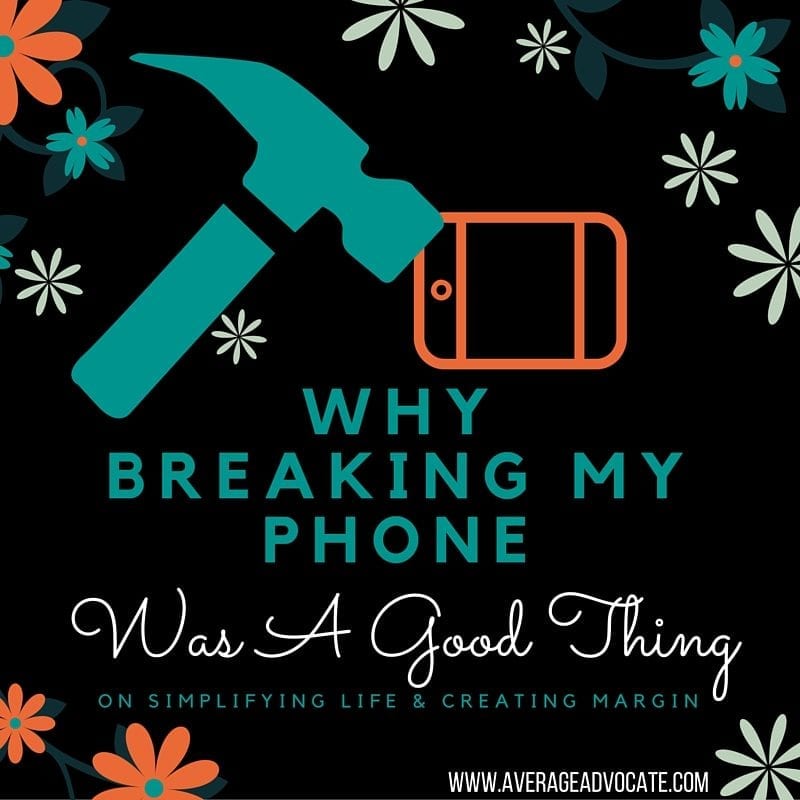I’ve been trying to follow my “Ideal Week,” a new schedule I’m employing to create more margin in my life. I bet you wouldn’t be surprised to learn that breaking my phone was not listed as one of my week’s activities on this schedule. But sometimes the lessons we don’t plan to learn–like simplifying and unplugging–are planned in advance for us, somewhere out there in the void.
Recently I wrote about how the Little Black Dress Project is a little like a fast (check it out here, If You Want To Change The World, You Have To Fast). I was talking about how we have to give things up sometimes, “decreasing,” and simplifying, if we want to make a difference. We are otherwise too easily controlled by our circumstances and not proactive to the world around us, hurting our ability to love others. Willingly choosing decrease is a way for us to purposefully jump into the process of transforming into a world changer.
More often than not, though, we don’t choose decrease. It usually chooses us.
I’m Always Breaking My Phone
As a real life example, let me share with you about a significant problem I have. You see, I seem to break my phones often. Much too often. Let me give you a list of just all the smart phones I’ve broken (although my memory of the first ones mentioned here are a bit hazy):
- 2009 (Fall): First smart phone, a glorious DROID I
- 2010 or 2011: I upgraded to DROID II or III after breaking my first generation
- 2012? After another breakage, I remember getting a hand-me-down from my friend Lisa when she upgraded. It was the same type of phone as the last one.
- 2013? Possible phone breakage? Don’t rightly remember how many DROIDS I had through in this time, but it was enough. I lamented when they stopped making pull-out keyboard for these phones.
- 2013: Moved to Samsung Galaxy II after changing providers. Phone breakage might have also transpired at this time too. . .
- 2014 (Summer/Fall): Phone broke. Why? Couldn’t have anything to do with me, surely. Replacement with a Samsung Galaxy III.
- 2014 (later in the Fall): The new phone I got was used and apparently not in the best of conditions. The screen slowly started blacking out until I couldn’t see anything but the top left-hand corner. Not conducive for business. New phone. Same type.
- 2015 (Spring): Dropped new phone sufficiently while Husband was on travel. Ordered a Galaxy S4. I attempted various day trips without GPS while listening to the first few chapters of the audiobook, Harry Potter and the Order of the Phoenix, over and over on the internally working, but black-screen of my previous Galaxy III (Apparently, that was what was playing when I finally gave up on that broken phone. Unfortunately, it would not register any finger touches except for “play,” and every time it turned back on, it would restart the book).
- 2015 (Fall): Broke phone screen. Decided to save money by just replacing the screen. $100 and some malfunctions later, I had a new screen, but really wished I just spent that $100 on another new-to-me Galaxy S4.
- 2016 (Spring): Despite the sturdier case and the tempered glass (which incidentally kept the phone screen from shattering merely a week after the screen was replaced), it cracked it near the speaker–the only place it wasn’t protected–and after being dropped, hitting that same part of the phone over and over for months, the screen fully broke.
Now that I’m counting, I think I have gone through 12-15 phones since I got my first cell phone 12 yeas ago (a pay as you go emergency TracPhone hand-me-down from my sister-in-law). Notice this: In the same time period, my husband has gone through only 3–upgrading once when switching to a smart phone, and once because we changed service providers.
See, I told you I have a phone problem! And I can’t entirely blame on my kids either (although I do feel justified blaming 50% on them).
Although I will continue trying to take care of the resources I’ve been given, like my phone, I feel like there is a flip-side to my unintentionally destructive-to-devices nature. Or maybe I just want to selfishly spin the bad as good. Regardless, I invite you to join with me appreciating all the times I was required to go back to the good ol’ days (or so I’ve been told) of unplugging (i.e., being forced to simplify).
The Good and the Ugly of Breaking My Phone
So what can you learn from being unplugged for a week? Why is this type of simplifying good? Does it actually help create margin, and help us look outward as world changers?
First of all, there are a lot of downsides to not having a phone. These might be obvious, but you can see how they affected me personally this time around below.
Here is my list of the bad things about being unplugged:
- I had to go a few places this week where I needed directions. Living without GPS was hard!
- For a couple days, most of my day was spend killing time until I received a phone call to pick up one of my kids. Waiting for a phone call is exceptionally difficult without a phone. It turned out I found myself waiting a lot more than usually to facilitate fulfilling this responsibility. How many things can you learn while waiting around with a toddler in inconvenient locations? ‘Nuff said.
- Working was hard. There is a lot of five-minute periods of down-time in my day job of being a professional domestic goddess (i.e., stay-at-home mom, homeschool teacher, and household manager). In these periods, my phone usually allows me to get more work done, whether it is answering a quick email, coaching someone via text, or posting something to Average Advocate’s social media sites. Getting work done on the go without my phone was near impossible.
- My kids would ask me a question, and I didn’t know the answer. Actually, I often don’t know the answer, but with my phone I could at least look it up! At one point when I answered “I don’t know,” my kids asked me to ask Google, but were then horrified to remember I couldn’t without my device. I went from being able to know all the things, to humbly having to acknowledge I don’t actually know that much.
Yes. I agree. On a logistical level this phonelessness kinda sucked. But there are some major positives. And these good things are why wise people and myself think that it is ideal to be unplugged every once in awhile.
Here is my list of the good things about being unplugged:
- I had to plan much better in advance, by finding directions, deciding where I was going to go, and arranging meetings and bringing books. This planning requires skills.
- Waiting requires one to learn some great maturing characteristics, like patience. (Note that I did cryptically said “one” rather than “I,” because I am not so sure I soaked up this valuable lesson in obtaining patience.)
- Without entertainment always at my fingertips, I also had to learn to how to manage boredom and appreciate the quiet. Being alone with with my thoughts and not distracting myself at a whim is a legit challenge.
- The only people that really mattered were those right in front of me. I couldn’t do anything to connect with people via my phone so I paid a lot more attention to my kids and respond more to the people around me. Not surprisingly, if you want to foster an optimal environment to love those directly around you, loose the phone. Or break it. (It doesn’t really matter which.)
- Going with the above, without my phone, my world was suddenly smaller. There weren’t hundreds of things to juggle. I only had to juggle what was directly in front of me, which happened to be a lot less than I usually try to accomplish. This was great.
- Having no phone challenged me to learn contentment. I could either be pissed off and stressed by my situation, or I could make the most of it.
- It was much easier to rest because I was ignoring everyone I wasn’t getting text notifications from. Or more accurately, I wasn’t aware of the notifications, nor did I really want to look for them by logging into my computer.
- Not surprisingly, it made me grateful that I had a phone before it broke and had enough money to buy a new one. It is hard not to be so thankful for these little electronic devices of connection, knowledge, organization, and entertainment!
Here is one question to ask yourself:
- Of all the good things Elisa learned by going without a phone for a week, which one do I need to learn the most?
The Heart Issue Of Going Without a Phone
I think contentment is one of the root heart issues that going without a phone addresses. I mean, there are a lot of heart things, maturing things, that having a broken phone can teach you (as evidenced above). But without phones it becomes so much harder for us to control our reality, circumstances that our version of contentment depends on.
We are therefore either forced to go back to the good ol’ days of controlling our world through different and less effective methods. Or we can simply acknowledged that “control is an illusion,” as one of my favorite authors, Skye Jethani says. Of course, in a practical sense, we need to learn those other methods of organizing, communicating, and learning. (After all, the people of earth will need a lot of well-adjusted world changers when the huge magnetic pulse wipes out all electronics during the zombie apocalypse.)
Truth is, that if we want to be world-changers, we also have to let go of the control and embrace contentment (which I talk about a lot more here, in If You Use Your Options, Misery Is Optional).
The ancient theologian, the Apostle Paul once said,
“I have learned the secret of being content in any and every situation, whether well fed or hungry, whether living in plenty or in want. I can do all this through him who gives me strength.” (NIV Philipians 4:12-13)
I am almost positive the modern translation also adds, “I have learned the secret of being content . . .whether in having a great smart phone, or when I have to go without.”
As I’ve already mentioned, sometimes growing in character through simplifying happens in the least welcome ways and during the least welcome times. But sometimes world changers can choose to fast, such as unplugging to learn these valuable lessons. Why? Because we don’t want our devices to control us. And we also don’t want to be dependent on them to control our worlds in order to find contentment and be free of fear. As long as our phones are coping mechanisms, we will be hindered as a world changers.
If you think you are controlled by your device, or if your device is your way of controlling your reality, I highly encourage you to consider unplugging from your phone for awhile. Working on these areas will help you grow profoundly as a world changer.
Ask these questions of yourself:
- How does my device control me? How to I use it to try to control my world?
- Should I consider unplugging for a week to learn contentment without my phone?
Can’t Have Your Cake, (Ahem, Phone) and Eat It Too
Although you might have less to juggle without your phone and without it you can learn so many great, maturing lessons, you can’t just break your phone permanently. Well, that isn’t accurate, because you can. But your commitments must match your phonelessness. Getting rid of your phone without changing your commitments won’t help you simplify and create more margin in your life. Instead it will simply create more stress and more frustration, especially those trying to working with you.
Breaking our phones can’t be used as a rule of thumb when it comes to our best way of loving people. After all, we don’t actually want you to break you phone if your current world-changing role is lay-counseling via text message now, would we? Considering, next week I’ll have another post out about when the best time for you, with your unique passions, to unplug in order to create more margin and simplify your life.
Although my track record shows I might again go through this process again next year, maybe I will magically stop breaking my phone once I learn contentment while being unplugged. Regardless, of if I schedule it though, I am growing in maturity, something I need if I am going to love other well. We world changers can’t afford to be controlled by things that hinder us–even our phones.
If juggling life is something you struggle with, check out this book, The Blessed Juggle, by Steph Fink.













Trackbacks/Pingbacks